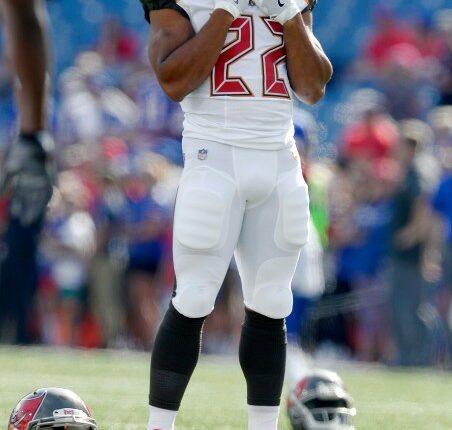Share this @internewscast.com

Nearly two decades ago, Doug Martin made his way to Boise State University, stepping onto its iconic blue turf as a relatively unknown recruit from Northern California. Despite his modest stature, Martin’s determination and grit transformed him into a formidable running back, eventually earning him a place as a first-round NFL draft pick.
Affectionately known as the “Muscle Hamster” due to his compact build and tenacious playing style, Martin made a name for himself with the Tampa Bay Buccaneers. Over his seven-year NFL career, he was twice selected for the Pro Bowl and secured a lucrative contract in 2016. However, his aggressive style of play led to numerous injuries, limiting his time on the field and ultimately playing a role in his decision to retire.
Tragically, Martin’s life came to an untimely end over the weekend in Oakland, the city of his birth and where he concluded his professional career with the Raiders seven years prior.
According to Oakland police, Martin, aged 36, died following a “brief struggle” with officers who had detained him early Saturday morning while investigating a reported break-in. He became unresponsive during the arrest and was later pronounced dead at a hospital. The cause of his death has yet to be determined.
Many details remain unclear, such as the number of officers involved, the duration of the struggle, and the methods used to restrain Martin. As the investigation continues, the officers involved have been placed on paid leave, in line with standard procedures.
In light of these events, Martin’s former agent released a statement on Monday, at the request of Martin’s family, revealing that he had privately struggled with mental health issues that significantly affected both his personal and professional life.
On the day he died, Martin felt overwhelmed and disoriented, fled his home and entered a neighbor’s home two doors down, where police confronted him, said the former agent, Brian Murphy.
Martin’s parents had sought medical help for him and contacted local authorities for support, Murphy said. “Ultimately, mental illness proved to be the one opponent from which Doug could not run,” he said.
Martin arrived at Boise State from Stockton, California, and saw little playing time his first two seasons. He was even moved to defensive back for a while before returning to running back only because injuries had left the position thin.
But he led the school in rushing and was named all-conference his final two seasons, leaving as one of the greatest running backs in school history.
Tampa Bay traded up in the 2012 draft to select Martin in the first round, a move that paid off almost immediately. He broke out in the second half of his rookie year and was selected for the Pro Bowl.
He burst onto the NFL scene that season with a 251-yard, four-TD rushing performance against Oakland — tied for the 12th-most rushing yards in a single game in NFL history and still a franchise record for the Bucs.
Martin described his running style as aggressive and relentless. During his career with Tampa Bay, he twice ran for more than 1,400 yards, but he failed to come close to that in the other four years mainly because he was hurt.
Martin was suspended for four games during an injury-filled 2016 season for violating the NFL’s policy on performance-enhancing substances and entered a treatment facility rather than appeal the ban.
He issued a statement at the time, saying that on the field he was determined to push through pain and injuries to become an elite running back.
“Off the field, I have tried that same approach in my personal life,” Martin said. “My shortcomings in this area have taught me both that I cannot win these personal battles alone and that there is no shame in asking for help.”
Bucs general manager Jason Licht said after the suspension was announced that Martin was “working through issues that are much larger than the game of football.”
Martin spent one more year with Tampa Bay before signing a one-year contract with the Oakland Raiders ahead of the 2018 season. He started nine games and rushed for 723 yards in his final season.

















